Summer School ‘Cultures, Migrations, Borders’ (Greece)
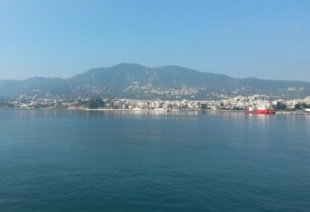 |
| In the port of Mytilene (Lesbos, Greece) |
July, 2015. Lesvos. It is Greece’s third largest island situated in the eastern Aegean. Around one and a half hours away by sea is the territory of Turkey. Arriving in the central city of Mytilene on a flight from Athens, you do not quite realize from the very beginning that it is actually an island and there is a state border running somewhere near. Neither can you think of the place as an intersection of thousands of people’s paths in search for a better life and simply a peaceful sky overhead.
Lesvos and other Greek islands – Chios, Leros, Samos, and Kos – have in recent years turned into a kind of ‘gateway’ to Europe for migrants and refugees from Syria, Afghanistan, Iraq – the countries torn apart by ongoing conflicts and internal contradictions. Hundreds of people come to the island every day – those who managed to make it across the strip of sea stretching dozens of nautical miles off the Turkish coastline.
From January to July 2015 alone, over 61,000 people (of the total of at least 124,000 who reached Greece by sea in the same period) arrived in Lesvos. All of them seek to continue their journey on to Europe (Hungary, Germany, Scandinavia, etc.). Many have to spend a long time on the island (from several days to several months) waiting for official papers to be issued for them to move on. It is mostly men. Recently, there has been an increase in the number of women and children coming as well. The absence of infrastructure and personnel needed to organize the stay of these people on Greek islands and the ever growing numbers of newly-arrived resulted in a serious humanitarian crisis here – refugees and migrants have to stay and even sleep outdoors for long or stay in overcrowded rooms at centres not equipped to accommodate people at all. Different international organizations (primarily non-governmental ones) that operate on the island today, as well as civil organizations and networks of locals, such as ‘Village of All Together’*, undertake titanic efforts on a daily basis to improve the conditions of stay for refugees but the scale of what is happening simply goes far beyond their capabilities and, apparently, beyond those of the Greek state as a whole, whose resources do not allow the somewhat tangible change in the situation here and now. It is becoming increasingly evident that these processes are of all-European importance and have implications for the entire Europe.
In this regard, it seems particularly important to raise public awareness of the issue, to intensify assistance in solving refugees and migrants’ problems, and to carry out a comprehensive analysis of the migration processes taking place in the region. The academic community is also called upon to contribute. 2015 was the fourth year in a row, when the Department of Social Anthropology and History of the University of the Aegean jointly with the Institute for Migration and Ethnic Studies (the University of Amsterdam) held an international summer school ‘Cultures, migrations, borders’ in Lesvos. This year, it was run from July 6th to July 18th and attracted over 40 participants from countries of Europe, Asia, and America. Among them were undergraduates, master students, young researchers, and fellows from universities, research and other organizations who deal with migration issues.
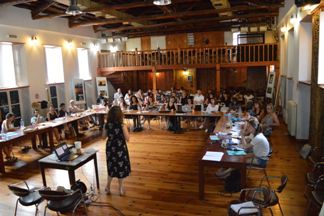 |
| In the lecture of Professor Bridget Anderson (At Plomari Community Centre) |
The programme of the school was formed along four thematic lines and proved very saturated. It included theoretical and methodological questions in migration and border studies, institutional and political aspects of migration, as well as the study of actors involved in migration processes in one way or another (immigrants, refugees, host community). Last but not least, the school offered the opportunity to experience and study cross-cultural encounters and interaction of the host community and immigrants on the border. The school itself, with its interdisciplinary charge and international participation, became a meeting point of different backgrounds and experiences, a place of cross-cultural encounters, polylogue, and of studying in the atmosphere of cognitive diversity and openness. The invited experts, lecturers, and experienced researchers held classes on a variety of aspects of studying migrations and borders, both in the historical and contemporary perspective.
Among the topics covered were the following: “Borders and persons: Unmixing and fixing in the post - Ottoman southern Balkans” (Jane Cowan, the University of Sussex, UK), “Geographies and borders of (il)legality”, “Bureaucratic practices and the study of migration” (Heath Cabot, Atlantic College, USA), “The anthropology of the relations between borders and persons”, “Life, death and movement in the Aegean” (Sarah Green, the University of Helsinki, Finland), “Solidarity with the 'Other'” (Katerina Rozakou, the University of Crete, Greece), “'Integration' as incantation: Exorcizing or cannibilizing the outsider in Europe” (Flip Lindo, the University of Amsterdam, the Netherlands), “Migration, "hospitality and the negotiation of difference in contemporary Greece” (Evthimios Papataxiarchis, the University of the Aegean, Greece), “Slavery (European) citizenship and the troubling case of migration” (Bridget Anderson, Oxford University, UK), “Migrants and agency” (Pinelopi Topali, the University of the Aegean, Greece), "Mixed" marriages on the Greek-Albanian Border: The household as a site of power, violence and transformation” (Marica Rombou-Levidi, member of the research network EastBordNet, Greece).
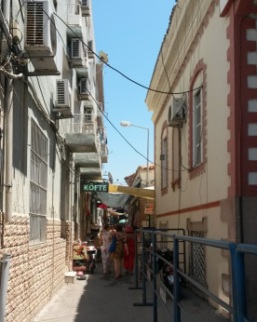 |
| Entering the field (Ayvalik, Turkey) |
Apart from that, there were two intense fieldtrips organized within the summer school: one to the Turkish seaside town of Ayvalik, involving state border crossing experience, and the other to the capital city of Lesvos, Mytilene, with the aim of visiting the centre of first reception of migrants and refugees in the island. Before the first trip all the school participants were divided into six groups each of which was set a particular task, e.g. to find out what residents of Ayvalik know about the Greek crisis and the referendum of 2015, etc. The groups spent the whole day in the field trying to orient themselves in a new environment and collecting information independently of one another, while tackling different practical issues related to the task. After the trip each group presented its field research and all the participants discussed the results achieved and exchanged individual impressions of the trip. The field trip was a valuable hands-on experience of crossing and overcoming different borders and boundaries, both visible and invisible, and thus a great learning experience as well.
Particularly emotionally charged and complicated turned out to be the visit to the centre of first reception of refugees – the refugee camp, as it is often referred to – in Moria, a village not far from Mytilene. It is precisely here that the scale and the drama of the humanitarian crisis unfolding in the island become evident. The area enclosed by a barbed wire and a fence, the grey cold walls of rooms looking pretty much like prison cells. Hundreds of people in waiting. Some of them are seated in tents or under some improvised coverings, whereas many have to stay under the blazing sun – within the outer perimeter of the centre. Others are standing in the overcrowded rooms, within the inner perimeter, looking out small barred windows.
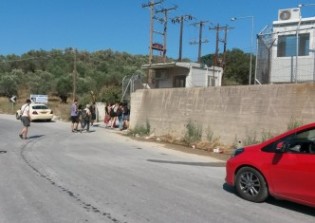 |
| At the refugee reception centre in Moria |
Called on to analyze what we would see here as researchers, once in the field, all the participants ultimately concluded that this task was hardly feasible. From the very first steps on the territory of the centre we realized the ambiguity of our position and for many, emotions came to the forefront. Many of us were simply overwhelmed by the whole scene. However, we managed to talk to a few representatives of humanitarian organizations operating in the camp – UNHCR (the UN Refugee Agency), Doctors of the World, and Metadrasi – and to get important first-hand information. Some of the participants even got to talk to the refugees themselves. For many of us, the turning point of our stay there was the unexpected and pleasant acquaintance with a group of young men from Afghanistan who approached us and, thanks to one of the participants who knew Farsi, could tell us their personal stories. They also shared a watermelon with us which they had just bought at the camp! There was a feeling that in the end, we are all humans, without borders.
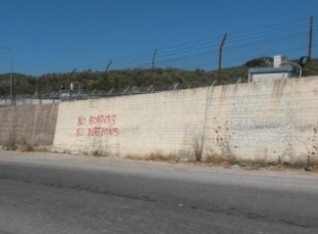 |
| A few words of support for the refugees on the walls of the center: ‘No borders, no nations’ |
Extremely interesting and informative was the meeting with the representative of the ‘Doctors without Borders’ organization, Apolstolos Veizis, which took place in the Mytilene municipality building right after our visit to Moria. As a specialist with many years of experience in the humanitarian field in different conflict zones of the world, Apostolos Veizis clearly and convincingly presented his view of the migration and humanitarian situation facing refugees and the Greek society today, considering the public awareness and comprehension of the existing problems, both in Greece and beyond, to be one of the topical objectives.
One more thought-provoking and beneficial part of learning during the school was PhD seminars where the participants could present their research projects and receive a feedback. The discussions held in the seminars were substantive and productive, and in fact it was brainstorm sessions from which everyone could take away something new and useful for their research. I also took advantage of the opportunity to present mine carried out on the Greek community of Tomsk and still feel so grateful for all the peer and expert comments and questions. It is noteworthy that all the fellow participants have got rich and diverse research and work experience with issues related to the school theme which allowed us to learn from one another as well.
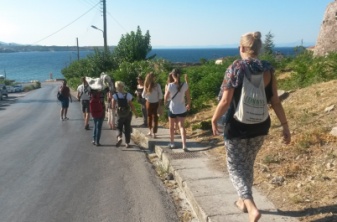 |
| A walking tour of Mytilene for the school participants |
Despite the very packed schedule and thanks to school organizers’ assistance along with the active engagement of the school participants, we managed to go places, meet people and get to know many things about the island, its history and residents and their everyday life, as well as about the school venue – Plomari village. We watched and discussed a thematic film, we went on a walking tour of Mytilene given for us by Vasiliki Bouratzi, one of the school organizers, we had a meeting with representatives of the grass-root action network ‘Village of All Together’ as well as with members of the Photographic Society of Mytilene who are actively involved in refugee problems solving in the island and told us about the specificities of their work among refugees, some life stories of the latter and showed us a lot of pictures, some of them being exhibited permanently at our study room – the Plomari Community Centre (Polykentron) situated in the beautiful building of the Soap Museum Factory. Here, during the tour of the Soap Museum Factory, we learnt about the history of Plomari village.
Importantly, the programme of the school offered a lot of possibilities for informal communication and exchange of ideas with the school experts and fellow participants which helped create a warm and friendly environment.
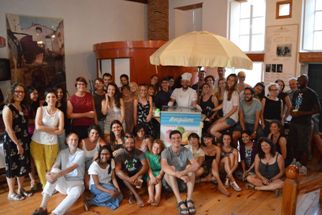 |
On the whole, such a variety of forms of learning and active engagement in the school events allowed each of us to accumulate by the end of the school a significant amount of new knowledge, experiences, feelings, and impressions which continues to be a source of ideas and inspiration, positive emotions and intellectual support. The summer school in Lesvos was indeed a vivid, thought-provoking, and memorable event! It was a success! The school constitutes an important and much needed platform for interaction and cooperation of researchers, students, practitioners and volunteers striving to not only study the problems related to migration but also contribute to the solution thereto. I am extremely glad to have participated in this event and grateful to the TSU Laboratory for Social and Anthropological Research, the summer school organizing team, the University of the Aegean and its partners for this opportunity!
Elena Karageorgii, TSU LSAR junior research fellow
*Village of All Together – an action network organized by residents of Lesvos with the aim of solving problems facing the refugees and migrants arriving in the island and of providing for the decent conditions of their stay here. Its creation in 2012 was also a response of the local population to the economic crisis and its implications as well as an act of solidarity against the ever increasing racist propaganda of the extreme right political forces (the ‘Golden Dawn’). The ‘Village of All Together’ have managed to get at their disposal from the Municipality of Mytilene the territory and infrastructure of the summer camp ‘PIKPA’ to accommodate and take care of the refugees. It is a self-organized and self-managed independent network without access to Greek state or European funds which operates thanks to the resources of its members and public and individual donations. Since 2012 and to the present day, members of the network have received and helped over 6000 refugees, some of whom spent here up to a year. Among the refugees staying in PIKPA are those who applied for the official refugee status, those who came to Lesvos to then reunite with their families living elsewhere in Europe, and those who are most vulnerable – children, pregnant women, people with disabilities, etc. Here, volunteers and members make efforts to provide these people with food, clothing, medical assistance, as well as to organize classes of English and Greek and other activities, especially for children. Due to the ever growing number of newly-arrived refugees and migrants in the island, the network is constantly in need for all kinds of external support – importantly but not exclusively the material one. More information about the latest developments, current needs, initiatives and undertakings by the ‘Village of All Together’ is available on Facebook.





 The project "Man in a Changing World. Identity and Social Adaptation: Past and Present" is funded by the Russian Government
The project "Man in a Changing World. Identity and Social Adaptation: Past and Present" is funded by the Russian Government 